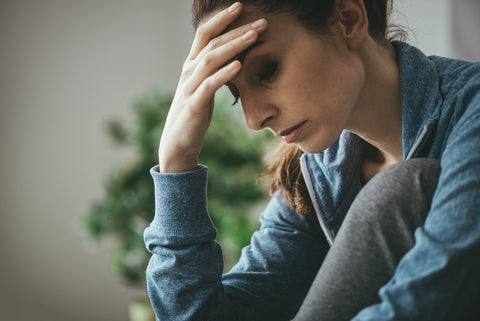Weighted lap pads are used for self-soothing and self-regulation in both children and adults. If you're an adult who suffers with anxiety or depression, a weighted lap pad is an easy way to self-soothe while you're at work or any time you’re sitting upright.
Weighted lap pads may also benefit older adults. For elderly people who have dementia or Alzheimer's disease, weighted lap pads may help ease restlessness, anxiety and insomnia. Here's a useful guide to weighted lap pads for adults, including information about sizing and fabric.

Weighted Lap Pads for Adults
So what is a weighted lap pad? Like a weighted blanket, a weighted lap pad is sewn with individual pockets that contain polypropylene pellets (which give the lap pad its weight).
At SensaCalm, our weighted lap pads weigh two pounds and measure 12 inches by 18 inches. They are available in a wide range of patterns and colors, including colorful prints. We also offer weighted lap pads in a super soft waterproof fabric.
Additionally, our lap pads are totally machine washable and dryable on a low setting. You can also add a cuddle fabric backing, which gives extra softness to sensory seekers.
Because weighted lap pads are made with additional weight, they deliver the benefits of deep touch pressure stimulation. According to Claire Heffron, a pediatric occupational and physical therapist, “Deep pressure has been found to impact the autonomic nervous system (ANS), the part of the nervous system that regulates breathing, heart rate, and many other functions of the body.”
By calming and relaxing the autonomic nervous system, weighted lap pads may help reduce anxiety and help individuals feel more relaxed.
Facts About Anxiety
According to the Anxiety and Depression Association of American, anxiety affects 40 million adults in the United States, making it the most common form of mental illness in the country. Here are some facts about anxiety you may not know.
Some Amount of Worry Is Normal
While everyone feels anxious or blue from time to time, persistent anxiety and depression can interfere with your daily life. So-called “general worriers” spend around 55 minutes each day feeling anxious — something mental health experts consider normal.
If you spend over an hour each day worrying, however, you may have a more serious problem. For example, people with generalized anxiety disorder (GAD) spend about 300 minutes of their day worrying.
Anxiety Comes in Many Forms
Anxiety isn’t a one-size-fits-all mental health disorder. Rather, it can present in a number of forms. Whereas some people have GAD, which affects about 3 percent of the U.S. population, others suffer from post-traumatic stress disorder, panic disorder or obsessive-compulsive disorder.
Women Are at a Higher Risk
Women are two times as likely as men to develop some form of anxiety disorder. Women also tend to experience anxiety at a younger age compared to men. Additionally, anxiety often presents with a co-occurring disorder, such as depression.
Anxiety Could Have a Genetic Component
Was your parent a worrier? Do you have a sibling who also experiences anxiety or depression? Research shows that there may be a hereditary factor at play when it comes to an individual’s likelihood of developing anxiety.
Anxiety Can Get Worse with Age
Anxiety can strike at any age, but it is particularly common among the elderly. The Geriatric Mental Health Foundation states that as many as 20 percent of all seniors suffer from anxiety. Unfortunately, many older adults don’t receive treatment for their anxiety.
Anxiety is Highly Treatable
Now for some good news. Anxiety can be frustrating and even debilitating, but it is also highly treatable. While some patients do well with prescription medications, others prefer a natural alternative to pharmaceuticals. And among older adults, anxiety medications can sometimes interfere with other drugs.
This is where a weighted lap pad may be able to help. Research shows that firm but gentle pressure on the body can promote calm and relaxation. Known as “deep pressure touch stimulation,” this type of therapy may help older adults feel less anxious. A weighted lap pad can deliver this gentle, consistent pressure in the convenience of a pad that drapes over the legs.
How to Help Seniors with Alzheimer’s Disease Relax
At SensaCalm, our cuddle fabric backing is a popular option for caregivers who work with dementia and Alzheimer’s patients. If your elderly loved one suffers with either condition, you may have heard of twiddle aprons or Alzheimer’s blankets. These products are designed to help ease some of the fidgeting and restlessness common among people with dementia and Alzheimer’s disease.
Additionally, we’ve even heard from caregivers who tell us their older loved one likes to place a fidget quilt or twiddle apron over the weighted lap pad. The fidget or twiddle apron keeps the senior’s hands busy while the weighted lap pad applies gentle pressure to the lap and legs. We like to say it’s a bit like getting a nice, long hug around your lower half.
Weighted Lap Pads for Work, School or On-the-Go

The nice thing about weighted lap pads is they can be used just about anywhere, including at home, the office or even during travel. If you’re an anxious flyer, a weighted lap pad may help you feel more comfortable and relaxed on your flight.
If you work in an office, a weighted lap pad is an easy and convenient way to get a little self-care time in at work. Small and portable, our weighted lap pads can be folded up and tucked in a purse, bag or desk drawer when not in use.
Shop SensaCalm Weighted Lap Pads for Adults
SensaCalm weighted lap pads are made right here in the U.S.A. by our team of talented artisans. For ten years, we’ve been the industry leader in weighted blankets, weighted lap pads and similar products for adults and children. If you or a loved one has anxiety, a weighted lap pad may help alleviate your symptoms.
Questions? Get in touch by calling us at 855-736-7222, or use our online contact form to speak with one of our team members.
Disclaimer: The content on this website is not intended as a substitute for medical advice. Talk to your doctor or healthcare provider before undertaking any type of therapy or treatment.


